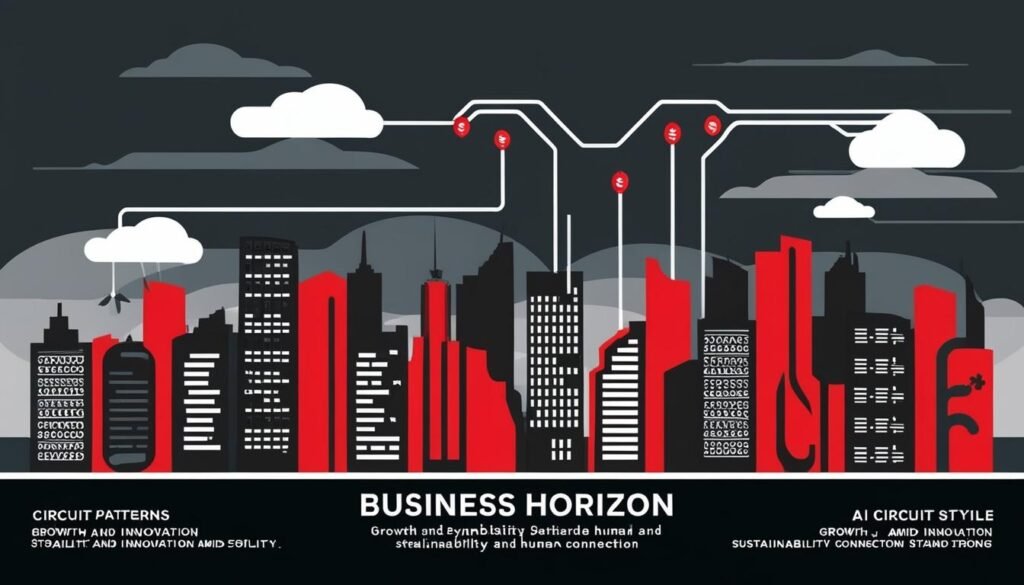As 2025 approaches, industry leaders emphasise the need for strategic foresight, highlighting the integration of AI and sustainability as key drivers for success in a stabilising economic landscape.
In 2025, businesses are poised to navigate a landscape marked by both opportunity and challenge, emerging from a tumultuous 2024 characterised by fluctuating inflation, political unrest, and evolving consumer behaviours. As they prepare for the new year, industry leaders are encouraged to adopt strategic foresight to drive sales growth and productivity.
Nick Gold, Managing Director at Speakers Corner, highlighted in the European Business Magazine that the conclusion of elections in the US and UK provides a more stable environment for business. “Leaders must accept that this is where we are and embrace the opportunities we now have,” he said. As companies move into 2025, it is essential for sales teams to step out of their comfort zones to maximise performance from the outset.
Emerging technologies, particularly in the field of artificial intelligence (AI) and automation, are set to revolutionise business operations reminiscent of the dotcom boom of the late 1990s. Gold points out that 2024 was largely exploratory regarding AI technologies, but he believes that 2025 will see tangible value derived from these advancements. “If 2024 was the year of exploration, in 2025, we’ll really start to see where the value of AI lies for our individual businesses,” Gold noted. By alleviating routine administrative tasks, AI can enable sales teams to focus on building personal connections with customers—an element he deems crucial as modern consumers are aware of automated interactions. This holistic view of sales success can foster customer loyalty and long-term partnerships, rather than solely focusing on immediate revenue.
Sustainability remains a significant driver of consumer choices, with growing evidence suggesting that consumers are willing to pay nearly 10% more for sustainably sourced goods, even amid rising living costs. Gold emphasised that businesses can leverage ethical practices as a compelling sales tool. “We’re no longer prioritising sustainability because we’re told we have to; we’re doing it because it’s the right thing to do,” he stated. As consumers increasingly align with brands that have a clear and genuine sustainability mission, leaders are called to ensure that this narrative resonates across their operations.
Talent development will also take centre stage in 2025, particularly as unemployment levels are expected to rise, influencing recruitment practices across industries. The pandemic-era dynamics of job mobility and the competitive landscape for talent have altered employer approaches. While the incoming national insurance increase may lead to more selective hiring, Gold advocates for investing in existing employees. “With highly targeted development opportunities, we can make our teams feel valued and motivated,” he explained, stressing the importance of cultivating a high-performing sales culture that drives results.
Overall, the focus for businesses in 2025 will be on integrating AI and automation, prioritising sustainability, and nurturing talent to ensure sales excellence. As the economic climate stabilises, organisations are expected to lay a robust foundation for growth—capitalising on technological advancements and emerging consumer trends to navigate the year ahead effectively. The clarity stemming from the conclusion of political uncertainties will serve as a backdrop as businesses seek to define their strategies and leverage new opportunities.
Source: Noah Wire Services
- https://www.businessleader.co.uk/us-election-result-uk-business/ – This article explains how the US election outcome, particularly a Trump presidency, could impact UK businesses through trade policies, market stability, and economic policies, which supports the discussion on political uncertainties and their effects on business environments.
- https://www.businesscomparison.com/blog/articles-features/us-election-could-affect-businesses-uk – This source details how the US election could affect UK businesses in terms of trade, market stability, and economic policies, aligning with the article’s points on the impact of political events on business strategies.
- https://www.cliftonpf.co.uk/blog/25102024174211-us-election-uk-economy/ – This article discusses the potential effects of the US election on the UK economy, including currency volatility, trade policies, and the impact on UK property and investments, which corroborates the section on political stability and economic climate.
- https://www.businessleader.co.uk/us-election-result-uk-business/ – This source mentions the potential for market instability and the impact on UK businesses due to Trump’s unpredictable approach to international relations, supporting the need for strategic foresight in navigating economic challenges.
- https://www.cliftonpf.co.uk/blog/25102024174211-us-election-uk-economy/ – This article highlights the differences in economic stability between a Trump and a Harris presidency, which affects UK businesses and property markets, aligning with the discussion on the importance of political stability for business strategies.
- https://www.businesscomparison.com/blog/articles-features/us-election-could-affect-businesses-uk – This source discusses the potential for new opportunities in green technology and artificial intelligence (AI) based on the US election outcome, supporting the section on emerging technologies and their impact on business operations.
- https://www.businessleader.co.uk/us-election-result-uk-business/ – This article mentions the impact of Trump’s policies on inflation and interest rates, which could affect UK businesses, supporting the discussion on economic climate and strategic planning.
- https://www.cliftonpf.co.uk/blog/25102024174211-us-election-uk-economy/ – This source explains how a stable international environment, potentially under a Harris presidency, could benefit the UK housing market and broader economy, aligning with the section on the importance of stability for business growth.
- https://www.businesscomparison.com/blog/articles-features/us-election-could-affect-businesses-uk – This article advises small business owners to maintain flexibility in their financial planning to mitigate risks arising from the US election, supporting the need for strategic foresight and adaptability in business strategies.
- https://www.businessleader.co.uk/us-election-result-uk-business/ – This source discusses the impact of the US election on currency exchange rates and foreign investments, which could affect UK businesses, particularly those with operations in the US, supporting the section on economic volatility and its effects.


